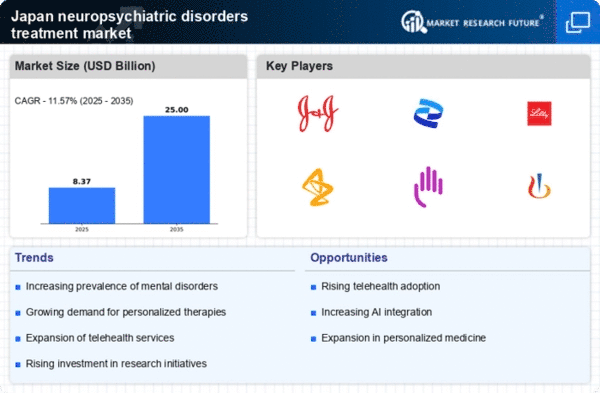Rising Awareness and Education
The increasing awareness and education surrounding mental health issues in Japan are crucial drivers for the neuropsychiatric disorders-treatment market. Educational programs aimed at both healthcare professionals and the general public are fostering a better understanding of neuropsychiatric disorders. This heightened awareness is likely to lead to earlier diagnosis and treatment, which can significantly improve patient outcomes. Surveys indicate that over 60% of Japanese citizens now recognize the importance of mental health, compared to just 30% a decade ago. As stigma diminishes and knowledge expands, more individuals are expected to seek treatment, thereby propelling the growth of the neuropsychiatric disorders-treatment market.
Government Initiatives and Funding
Government initiatives aimed at improving mental health care in Japan significantly influence the neuropsychiatric disorders-treatment market. The Japanese government has implemented various policies to enhance mental health services, including increased funding for research and treatment programs. In 2023, the government allocated approximately ¥200 billion to mental health initiatives, reflecting a commitment to addressing the growing mental health crisis. These investments are expected to foster innovation in treatment methodologies and expand access to care. Additionally, public awareness campaigns are being launched to destigmatize mental health issues, encouraging more individuals to seek treatment. Such government support is likely to create a more favorable environment for the neuropsychiatric disorders-treatment market.
Advancements in Treatment Technologies
Technological advancements play a pivotal role in shaping the neuropsychiatric disorders-treatment market. Innovations in pharmacotherapy, such as the development of novel antidepressants and antipsychotics, are enhancing treatment efficacy and patient outcomes. Furthermore, the integration of artificial intelligence in diagnostic processes is streamlining patient assessments, leading to more accurate and timely interventions. In Japan, the market for digital therapeutics is projected to grow at a CAGR of 15% from 2025 to 2030, indicating a shift towards technology-driven solutions. These advancements not only improve treatment options but also increase patient engagement and adherence to therapy, thereby driving growth in the neuropsychiatric disorders-treatment market.
Collaboration Between Public and Private Sectors
Collaboration between public and private sectors is emerging as a vital driver for the neuropsychiatric disorders-treatment market. Partnerships between government agencies, healthcare providers, and pharmaceutical companies are fostering innovation and improving access to care. For instance, joint ventures aimed at developing new treatment protocols and sharing resources are becoming increasingly common. These collaborations can lead to more comprehensive care models that address the multifaceted nature of neuropsychiatric disorders. In Japan, such partnerships are expected to enhance the efficiency of treatment delivery and expand the range of available therapies, ultimately benefiting the neuropsychiatric disorders-treatment market.
Increasing Prevalence of Neuropsychiatric Disorders
The rising incidence of neuropsychiatric disorders in Japan is a critical driver for the neuropsychiatric disorders-treatment market. Recent studies indicate that approximately 20% of the Japanese population experiences some form of mental health issue, including anxiety, depression, and schizophrenia. This growing prevalence necessitates enhanced treatment options and healthcare services. As awareness of mental health issues increases, more individuals seek help, thereby expanding the market. Furthermore, the aging population in Japan, which is projected to reach 36% by 2040, is likely to exacerbate the demand for effective treatments. The neuropsychiatric disorders-treatment market needs to adapt to these demographic changes to provide adequate care and support for affected individuals..























Leave a Comment